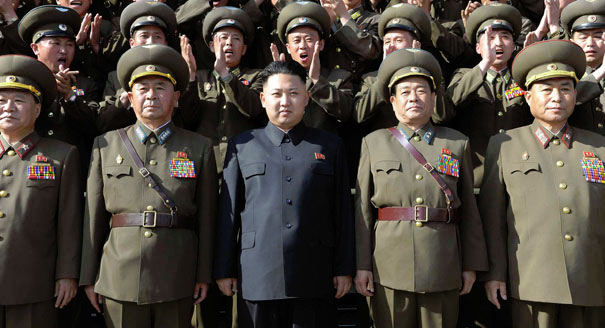The United Nations recently published a report prepared by a panel of experts that evaluates the implementation of the UN Security Council sanctions that were leveled against North Korea following Pyongyang’s nuclear explosives tests in 2006 and 2009. The June 29 report makes clear that in cases where the international community acts with resolution and unity, some efforts to contain North Korea’s weapons-related trade may succeed. However, the report also reveals that without firm commitments by North Korea’s trading partners, the effectiveness of sanctions will be limited.
Good News and Bad News
The UNSC report provides evidence that sanctions have made it more difficult on margin for North Korea to export weapons and to import the items it needs to continue development of weapons of mass destruction. That’s in part because UN member states have increased their surveillance of North Korea’s shipping fleet. Today, more than ever before, the number and whereabouts of North Korean vessels is understood and tracked in real time, assisting efforts to interdict suspicious cargo.
That’s the good news. But the bad news is that North Korea is responding to the increased vigilance over its maritime fleet by resorting to other means to feed its military-driven procurement programs. In particular, it now relies on air cargo transport, the transshipment of goods using foreign-flagged carriers, brokers operating in third countries, and the use of legitimate commerce to hide nefarious transactions.At the same time, and as if this were not enough, UN member states are struggling to enforce a sanctions regime on North Korea as that country’s foreign trade is on the rise. Reports from UNSC experts in 2010 showed that North Korea’s exports had increased from just over $1 billion at the beginning of last decade to $2.8 billion in 2008. The state’s imports also more than doubled during the same period, from $1.8 billion to $4.1 billion. The new UNSC report elaborates that, in parallel, North Korea is expanding its port facilities, is setting up new joint ventures and free-trade areas, and has embarked on fresh bilateral trade development initiatives with China and Russia.
China Is Still Key…But All UN Members Must Help
As was the case before UNSC sanctions were imposed on Pyongyang, China is by far North Korea’s biggest trading partner. China’s exports to North Korea have grown from about $300 million during the early 1990s to over $2 billion today, so Beijing’s responsibility for the success or failure of sanctions against North Korea is great. China has halted significant exports to Pyongyang’s nuclear and ballistic-missile programs, but its approach to sanctions is minimalistic and informed by Beijing’s interest in maintaining something like the political status quo in Northeast Asia.
So it should not surprise Beijing that the international community wants China to do more to make sure that North Korea does not find illicit trade partners in the People’s Republic.
The measures needed to improve sanctions compliance are not unique to China, but rather they should be implemented by all UN member states—especially by North Korea’s other transit and trading partners in the Asia-Pacific region. These measures include greater vetting of transit trade in third countries; improved intelligence cooperation to interdict goods; outreach from the United States and other resource-rich states to countries trading with North Korea, particularly on trade financing, money laundering, and North Korean efforts to recruit and train foreigners; and cooperation in monitoring and interdicting air cargo. The measures should also include greater direct cooperation between the UN’s broader membership and the UNSC. The Security Council’s resolutions require that UN members report violations to the UNSC, but none concerning Pyongyang’s weapons of mass destruction procurement have been reported by member states. A large number of UN members have not even complied with their obligations to report the actions they have taken to control their own trade with Pyongyang to the UNSC. Since 2009, Security Council members have not seen fit to substantially enlarge based on member state lists the UNSC’s list of North Korean persons and organizations subject to sanctions. China has never agreed to host a meeting of the UNSC experts with Chinese counterparts on its territory.
Looking Ahead
Experience should demonstrate that a rigorous, top-down national government commitment to trade controls coming from all of North Korea’s trading partners is essential to halt Pyongyang’s weapons trade. For example, before the German government—at the highest level—dramatically made all German exporters accountable by law to strict new requirements two decades ago, well-connected firms could often count on trade bureaucrats to look the other way when faced with lucrative but sensitive contracts. This spring, it was revealed that a supplier of mobile missile-launching vehicles for China’s military had provided this capability to Pyongyang. China denied that any export-control rules were broken. That may be correct, but there are questions about whether the influential state-owned company in this case was left to decide for itself whether it could export these items.
The UNSC report also documents North Korea’s apparent success in setting up a large-scale uranium enrichment plant after sanctions were first imposed five years ago—a success that marked a significant failure of nuclear export controls. Sanctions probably arrived too late to set this program back, but the international community needs to know what can to be done now to arrest or retard this project. An agreement by the sanctions powers—the five permanent members of the UNSC plus South Korea and Japan—to fund aggressive research in this area, and, more generally, to investigate the effectiveness of UNSC sanctions, would be a good place to start.







